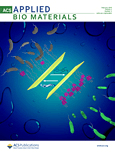
Materials Science & Engineering C-Materials for Biological Applications
Scope & Guideline
Pioneering new frontiers in biomaterials research.
Introduction
Aims and Scopes
- Biomaterials Development:
Research focused on developing new biomaterials that can interact positively with biological systems for applications in tissue engineering and regenerative medicine. - Drug Delivery Systems:
Innovative methods for delivering therapeutic agents using various nanocarriers, hydrogels, and other materials, aiming to enhance the efficacy and specificity of treatments. - Tissue Engineering:
Studies on scaffolding materials and techniques to support the growth and repair of tissues, including bone, cartilage, and soft tissues. - Biocompatibility and Bioactivity:
Investigation of the interactions between biomaterials and biological tissues, focusing on their safety, efficacy, and integration within the body. - Nanotechnology Applications:
Utilization of nanomaterials and nanostructures to improve material properties and functionalities for biomedical applications. - Surface Modification Techniques:
Research on enhancing the surface properties of materials to improve biocompatibility, drug delivery efficiency, and reduce bacterial adhesion.
Trending and Emerging
- Smart and Responsive Hydrogels:
There is a growing trend in the development of hydrogels that respond to environmental stimuli such as pH, temperature, and light, enhancing their functionality in drug delivery and tissue engineering. - 3D Bioprinting Technologies:
Research in 3D bioprinting is on the rise, focusing on creating complex tissue structures and scaffolds that mimic natural tissue architecture. - Targeted Nanoparticle Delivery Systems:
An increase in studies focusing on the design of nanoparticles that can specifically target tumor cells or tissues, improving therapeutic outcomes and reducing side effects. - Bioactive Coatings and Surface Modifications:
Emerging interest in the development of bioactive coatings for implants and scaffolds that enhance cell adhesion, proliferation, and overall integration. - Sustainable and Green Materials:
Research is increasingly oriented towards the use of sustainable materials and eco-friendly processes for developing biomaterials, reflecting a growing concern for environmental impacts. - Multifunctional Materials:
A trend towards developing materials that serve multiple functions, such as antibacterial properties combined with drug delivery capabilities, enhancing their applicability in biomedical fields.
Declining or Waning
- Traditional Polymer Biomaterials:
Research on conventional polymers for biomedical applications appears to be decreasing as more innovative materials and composites take center stage. - In vitro Testing Models:
Although still relevant, there seems to be a reduced emphasis on traditional in vitro testing in favor of more complex and predictive in vivo models or advanced in vitro systems. - Metallic Biomaterials:
The focus on traditional metallic materials, such as stainless steel and titanium, is waning in favor of more advanced materials that offer bioactivity and improved integration with biological systems. - Conventional Drug Delivery Methods:
Research on standard drug delivery methods is becoming less prevalent as the field moves towards more sophisticated systems that offer targeted and controlled release.
Similar Journals

International Journal of Nanomedicine
Unleashing the potential of nanotechnology for global health.International Journal of Nanomedicine, published by DOVE MEDICAL PRESS LTD, is a leading open access journal dedicated to advancing the field of nanomedicine and its applications in healthcare. Since its establishment in 2006, the journal has grown significantly, now encompassing a wide array of topics including bioengineering, biomaterials, biophysics, drug discovery, and pharmaceutical sciences, and is recognized in Q1 quartiles across major categories like *Nanoscience and Nanotechnology* and *Organic Chemistry*. The journal boasts an impressive standing within the Scopus rankings, with high percentiles across various related fields, making it an invaluable resource for researchers, professionals, and students seeking to stay informed on the latest innovations and developments in nanomedicine. With its commitment to fostering an accessible and collaborative academic environment, the International Journal of Nanomedicine serves as a vital platform for disseminating transformative research that impacts scientific practice and healthcare outcomes globally.

Biomaterials Research
Advancing biomaterials for a healthier tomorrow.Biomaterials Research, published by the American Association for the Advancement of Science, is a prominent open access journal established in 2014, dedicated to advancing the field of biomaterials. Based in the United Kingdom, this journal has swiftly become an essential platform for researchers and practitioners, offering groundbreaking insights in biomaterials, biomedical engineering, ceramics and composites, and miscellaneous medical fields. With its impressive Q1 ranking across multiple relevant categories in 2023 and its strong Scopus rankings, including a remarkable 90th percentile in the medicine category, Biomaterials Research showcases high-quality, peer-reviewed research designed to address both practical and theoretical challenges in biomaterials science. As an open access journal, it promotes wider dissemination and accessibility of research findings, crucial for fostering innovation and collaboration within the scientific community. Researchers, professionals, and students alike are encouraged to contribute, read, and engage with the latest developments in this dynamic field.

Biointerphases
Pioneering research that bridges biology and material innovation.Biointerphases is a distinguished academic journal published by AIP Publishing, showcasing cutting-edge research in the fields of biochemistry, biomaterials, chemistry, and materials science. With an ISSN of 1934-8630 and E-ISSN 1559-4106, this journal has made significant strides since its inception in 2008, continuing to provide a platform for innovative studies through 2024. As a testament to its relevance, it proudly holds Q2 and Q3 rankings across various categories, reflecting its critical role in advancing these multidisciplinary fields. Although not classified as an open-access journal, it maintains a respected position with a noteworthy impact factor and is highly valued by researchers, professionals, and students alike. Based in the United States at 1305 Walt Whitman Rd, Ste 300, Melville, NY 11747-4501, Biointerphases facilitates the exchange of ideas and findings that are vital to the progression of scientific knowledge and application.

ACS Applied Bio Materials
Transforming Ideas into Impactful Solutions in Bio MaterialsACS Applied Bio Materials is a leading academic journal published by the American Chemical Society, focusing on the innovative intersection of bioengineering and materials science. Since its inception in 2018, the journal has established itself as a pivotal platform for disseminating impactful research within the fields of Biochemistry, Biomaterials, Biomedical Engineering, and Chemistry, often ranked in the top tiers of these categories. With an impressive impact factor, it holds a Q2 ranking in both Biochemistry and Biomaterials, and a prestigious Q1 ranking in Biomedical Engineering and miscellaneous Chemistry, underscoring its significance in advancing knowledge and practices across these disciplines. The journal’s editorial commitment to high-quality, peer-reviewed research ensures relevance and rigor, appealing to a diverse audience of researchers, professionals, and students keen to explore breakthroughs in bio-related materials technology. The access options enhance its visibility and reach, allowing for a broader dissemination of studies that drive innovation and collaboration in biotechnology and material sciences. Located in the heart of Washington, DC, ACS Applied Bio Materials serves as a crucial resource for advancing the future of healthcare, engineering, and materials research.

Bioinspired Biomimetic and Nanobiomaterials
Pioneering the Future of Bioinspired EngineeringBioinspired Biomimetic and Nanobiomaterials is a distinguished journal published by Emerald Group Publishing Ltd, focusing on the cutting-edge intersection of biomaterials, engineering, and nanotechnology. Since its inception in 2012, the journal has provided a vital platform for researchers, professionals, and students to disseminate innovative findings that draw inspiration from nature to develop novel biomimetic and bioinspired materials. Although currently indexed in the fourth quartile for Biomaterials and third quartile for miscellaneous Engineering in 2023, the journal is committed to improving its standing and impact by welcoming contributions that exploit the functional capabilities of nanoscale and biomimetic structures. With a strategic aim to foster interdisciplinary collaboration, this journal plays an instrumental role in advancing the field of biomaterials and engineering. Join our community and contribute to shaping the future of sustainable material design and applications.

JOURNAL OF MATERIALS SCIENCE-MATERIALS IN MEDICINE
Pioneering Discoveries in Biomedical Materials ScienceJOURNAL OF MATERIALS SCIENCE-MATERIALS IN MEDICINE is a leading peer-reviewed journal published by Springer, dedicated to advancing the field of biomedical materials science. With an ISSN of 0957-4530 and E-ISSN 1573-4838, this Open Access journal has been committed to providing researchers and professionals with freely accessible, high-quality research since 2021. It features an extensive scope spanning bioengineering, biomaterials, biomedical engineering, and biophysics, reflecting its significant impact within these interdisciplinary domains. Recognized within the Q2 category of the 2023 rankings in multiple fields, the journal proudly positions itself as a crucial resource for innovative materials that contribute to advancements in medical applications. With impressive Scopus rankings, including 26th in Biophysics and 40th in Materials Science for Biomaterials, researchers, students, and industry professionals alike can rely on this publication for cutting-edge insights that drive the future of medical materials and technologies. Based in Dordrecht, Netherlands, the journal provides a vibrant platform for sharing groundbreaking discoveries and fostering collaborative research among a global audience.

Advanced Healthcare Materials
Innovating for a Healthier TomorrowAdvanced Healthcare Materials, published by WILEY, is a leading journal in the interdisciplinary fields of biomaterials, biomedical engineering, and pharmaceutical science. With its ISSN 2192-2640 and E-ISSN 2192-2659, the journal provides a platform for innovative research that encompasses the design, fabrication, and application of advanced materials in healthcare settings. Recognized for its high impact, it boasts a Q1 ranking in several categories, including a notable rank of #7/183 in Pharmaceutical Science and 14/137 in Biomaterials according to Scopus rankings. This reflects the journal’s commitment to publishing cutting-edge studies that push the boundaries of science and technology in medicine. Although it operates under a subscription model, articles published in this journal significantly impact the global research community and play a crucial role in the advancement of healthcare technologies. With a publication history from 2012 to 2024, Advanced Healthcare Materials remains an essential resource for researchers, professionals, and students engaged in the groundbreaking intersections of materials science and healthcare.

Frontiers in Bioengineering and Biotechnology
Advancing Knowledge for Healthier Lives and a Greener PlanetFrontiers in Bioengineering and Biotechnology, published by FRONTIERS MEDIA SA in Switzerland, stands as a leading platform for innovative research and developments in the fields of bioengineering and biotechnology. Since its inception in 2013, this Open Access journal has garnered significant recognition, reflected in its impressive category rankings: Q1 in Biomedical Engineering and Q2 in Bioengineering, Biotechnology, and Histology for 2023. With a focus on fostering collaboration and knowledge sharing, it aims to provide researchers, professionals, and students with access to pioneering studies that push the boundaries of science and technology. The journal, which is indexed in prominent databases, boasts high visibility and impact, evidenced by its impressive rankings across various categories in Scopus. As it continues to converge from 2013 to 2024, Frontiers in Bioengineering and Biotechnology is dedicated to shaping the discourse in its field and promoting advancements that have the potential to transform healthcare and environmental sustainability.

Materials
Pioneering discoveries in materials science for global impact.Materials is an esteemed journal published by MDPI, dedicated to advancing the fields of Condensed Matter Physics and Materials Science. With its commitment to Open Access since its inception in 2008, the journal has made significant strides in disseminating high-quality research globally, allowing researchers, professionals, and students easy access to cutting-edge studies without financial barriers. Hailing from Switzerland, the journal has shown remarkable growth and prominence, currently ranked in the Q2 quartile in its categories according to the latest assessments, which highlights its impact within the community. As the journal converges its focus from 2008 to 2024, it aims to continually foster a robust exchange of knowledge on innovative materials and their applications, thereby supporting the evolving landscape of science and technology. With an E-ISSN of 1996-1944 and a user-friendly platform, Materials is poised to be a leading choice for scholars eager to contribute to and engage with pioneering research.

Materials Today Bio
Bridging disciplines to transform biomedical engineering practices.Materials Today Bio, published by Elsevier, is an esteemed open-access journal dedicated to advancing the fields of bioengineering, biomaterials, and biomedical engineering. Since its inception in 2019, this journal has quickly made a name for itself, currently ranked Q1 in multiple categories including Bioengineering, Biomaterials, and Biotechnology, reflecting its exceptional quality and relevance in the rapidly evolving landscape of bio-related sciences. With an impressive Scopus ranking positioning it in the top 25% of its categories, Materials Today Bio provides a vital platform for researchers and professionals to share cutting-edge discoveries and innovative applications that bridge the gap between materials science and biological studies. Accessible to a global audience, this journal not only fosters collaboration among the scientific community but also aims to highlight significant advancements in cell and molecular biology, making it an indispensable resource for students and seasoned experts alike. The journal's commitment to open access since 2019 underscores its dedication to disseminating knowledge widely, ensuring that crucial findings reach those who can benefit from them the most.